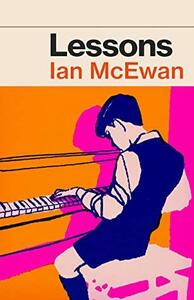Take a photo of a barcode or cover
reflective
slow-paced
Plot or Character Driven:
Character
challenging
sad
slow-paced
Plot or Character Driven:
Character
Strong character development:
Complicated
Loveable characters:
No
Diverse cast of characters:
No
Flaws of characters a main focus:
Yes
challenging
emotional
sad
slow-paced
Plot or Character Driven:
Character
Strong character development:
Yes
Loveable characters:
Complicated
Diverse cast of characters:
No
Flaws of characters a main focus:
Yes
A little drag-y in places but a stunning generational tale of a man who wanders and wafts, a man set upon doing things as he pleases, as he 'feels' right - the places of unfulfilled ambition that are not understood as time wasted.
Once again I'm reminded what it's like to be in the presence of a truly great novelist.
McEwan knocks it out the park with his story about one man Roland, and how his life was shaped by both the singularities of his childhood and the grand contours of history. It's a story about unlived lives, relationships, how we make meaning, and the messy complicated things that are human beings. If his treatment of world and British history felt a little didactic and slow at times, he made up for it with a keen eye for how we understand responsibility, both personal and collective.
One of the hinges of the novel is the 14-year-old Roland's sexual involvement with his piano teacher, so childhood abuse and trauma feature prominently, the unexpected ways its tendrils reach into a life.
McEwan's touch is so light and knowing, his agility between different styles and registers magisterial. The book I started reading afterwards felt plodding and fussy by comparison. His writing manages to be beautifully incisive while steering well clear of moralism. He's just another punter trying to make sense out of the world, McEwan's writing suggests.
Reading this book in parallel with Septology really brought home the way good writing can actively induce moods in the reader. I found myself viewing the world differently while reading both books. It was strange to be sharing Roland's sadness at the slow and tragic demise of his wife, or taking on Asle's silken nostalgia in frozen Norway, while relaxing by the river on summer holiday. But such is the magic of literature I guess.
McEwan knocks it out the park with his story about one man Roland, and how his life was shaped by both the singularities of his childhood and the grand contours of history. It's a story about unlived lives, relationships, how we make meaning, and the messy complicated things that are human beings. If his treatment of world and British history felt a little didactic and slow at times, he made up for it with a keen eye for how we understand responsibility, both personal and collective.
One of the hinges of the novel is the 14-year-old Roland's sexual involvement with his piano teacher, so childhood abuse and trauma feature prominently, the unexpected ways its tendrils reach into a life.
McEwan's touch is so light and knowing, his agility between different styles and registers magisterial. The book I started reading afterwards felt plodding and fussy by comparison. His writing manages to be beautifully incisive while steering well clear of moralism. He's just another punter trying to make sense out of the world, McEwan's writing suggests.
Reading this book in parallel with Septology really brought home the way good writing can actively induce moods in the reader. I found myself viewing the world differently while reading both books. It was strange to be sharing Roland's sadness at the slow and tragic demise of his wife, or taking on Asle's silken nostalgia in frozen Norway, while relaxing by the river on summer holiday. But such is the magic of literature I guess.
Between 3 and 4 stars. The book starts with a story written in a very pleasant way. But at approximately 3/4 of the books, when it could finish on a good way, more drama appears in the scene, which apparently helps the author to introduce small bites of what could be called, from my point of view, an opinion article. The book is almost nice. The boredom that makes you looking forward to finish the book ruins a little bit the big experience that could be this book.



